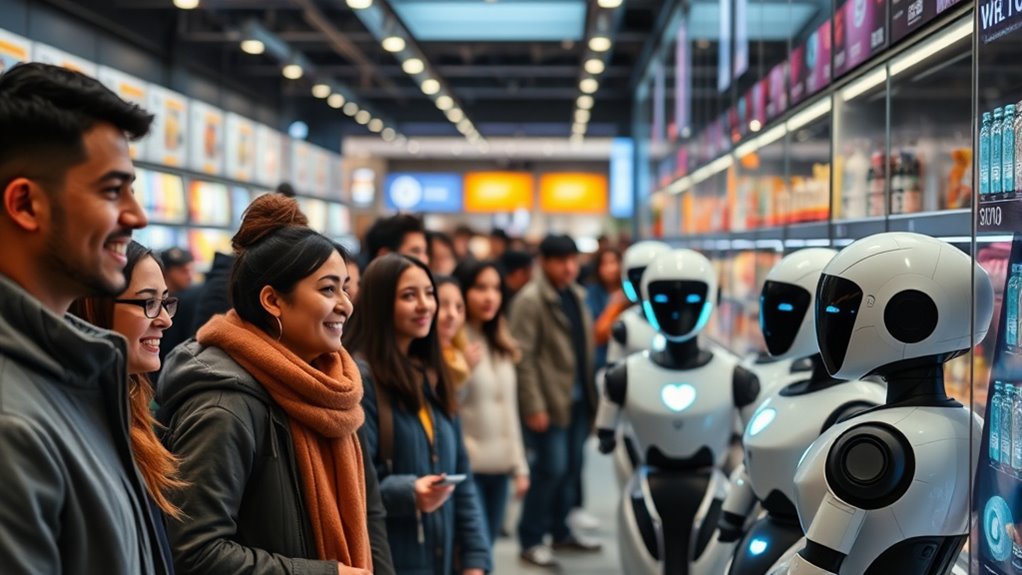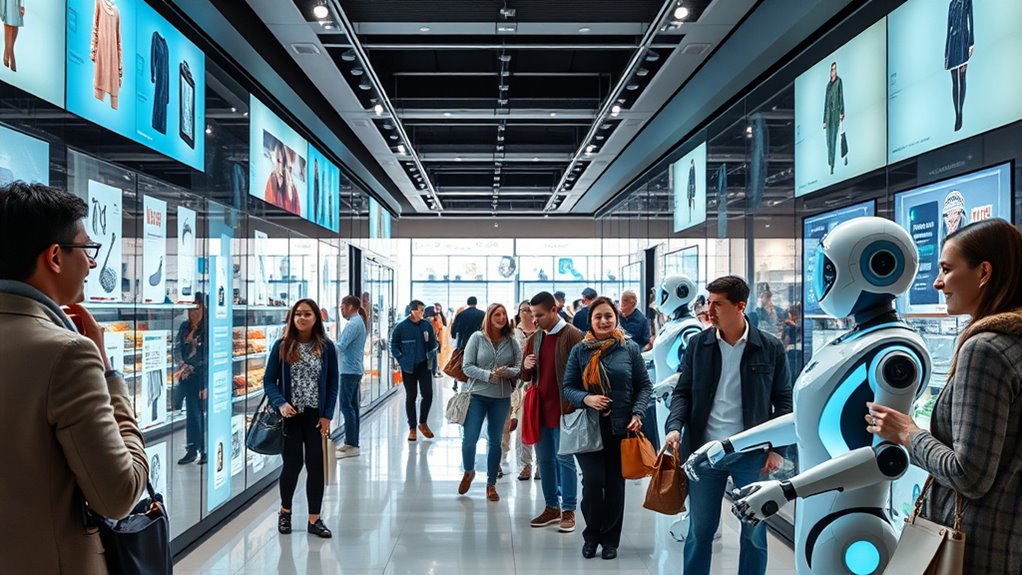In AI-powered stores, you shift from routine tasks to roles that require interpretation, emotional intelligence, and personalized service. Instead of just managing AI systems, you focus on creating memorable experiences, guiding customers through digital tools, and building relationships. Your role becomes more strategic and rewarding as you leverage AI insights to better serve shoppers. If you want to discover how your purpose is evolving alongside these innovations, there’s more to explore.
Key Takeaways
- Store associates transition to supervisory roles, focusing on interpreting AI insights and enhancing customer engagement.
- Humans provide emotional intelligence and nuanced support that AI cannot replicate, enriching the shopping experience.
- Collaboration between staff and AI tools creates more personalized, responsive service, strengthening customer loyalty.
- Automation handles routine tasks, freeing humans to build relationships and address complex customer needs.
- Human judgment and AI insights together shape innovative, memorable retail environments and strategic decision-making.

As AI becomes deeply integrated into retail stores, humans are discovering new roles that enhance both customer experiences and operational efficiency. Instead of replacing staff, AI tools like virtual assistants, smart mirrors, and chatbots serve as powerful allies, augmenting your ability to deliver better service. Store associates are shifting from routine tasks to supervisory roles, managing AI systems and interpreting the insights these tools generate. Your job is evolving into one that emphasizes emotional intelligence and nuanced customer engagement, areas where AI still falls short. When a customer has a complex question or needs a personalized recommendation, your human touch becomes irreplaceable, providing reassurance and understanding that machines can’t replicate. This partnership allows you to focus more on creating memorable shopping experiences, boosting your job satisfaction and sense of purpose. AI-driven personalization enables tailored experiences that make customers feel valued and understood, fostering loyalty and repeat visits. Additionally, the use of emotional intelligence skills becomes increasingly important as you interpret customer needs that go beyond what AI can analyze. AI also enhances your ability to deliver personalized shopping journeys. With hyper-targeted product recommendations and interactive virtual try-ons, customers feel more confident in their choices. As a result, their likelihood to purchase increases considerably—up to four times higher than without AI assistance. Customers are increasingly comfortable using AI-powered tools, with about 40% having tried them and most willing to reuse these services. This growing acceptance means your expertise in guiding and supporting these tools becomes essential. Additionally, AI-driven chat solutions help foster repeat business, increasing spending by around 25% through personalized interactions. Your role expands to include helping customers navigate these digital innovations, ensuring they feel valued and understood. AI also streamlines inventory and operational management. You benefit from smarter demand forecasts that consider sales trends, weather, and social media activity, reducing stockouts and excess inventory. This enables faster, more informed decisions, freeing you from manual tasks and allowing you to contribute to strategic initiatives. AI analytics give you easier access to data, empowering you to make better operational choices on the spot. The automation of repetitive tasks means you can dedicate more time to high-value activities, such as building customer relationships or handling complex issues. Your collaboration with AI tools creates a more efficient, responsive store environment, ultimately elevating both customer satisfaction and store performance. In this evolving landscape, your role is becoming more dynamic and essential. By combining your judgment with AI insights, you help shape a shopping experience that’s both innovative and personalized, proving that humans still hold a crucial purpose in AI-powered retail stores.
Frequently Asked Questions
How Do Human Roles Evolve With Increasing AI Integration?
As AI becomes more integrated, your role shifts from routine tasks to strategic, customer-focused activities. You’ll use AI tools to make faster decisions, personalize service, and identify issues early. Your focus will be on building relationships and providing emotional support, while AI handles data analysis and repetitive functions. This partnership allows you to enhance customer experiences, improve store operations, and contribute more meaningfully to your team’s success.
What Skills Are Most Valuable for Workers in Ai-Powered Stores?
Around 70% of retail workers say that adaptability is vital for success in AI-powered stores. You need technical skills like data literacy and AI tool proficiency, but also soft skills like emotional intelligence and creativity. By embracing continuous learning, you can handle complex tasks, personalize customer experiences, and collaborate effectively with AI. Your ability to adapt and innovate makes you essential in transforming retail into a more human-centered, tech-driven environment.
Are There Ethical Concerns About Replacing Human Jobs With AI?
Yes, there are ethical concerns about replacing human jobs with AI. You might worry about economic inequality, as AI impacts younger and lower-paid workers the most. It raises questions about fairness, accountability, and how companies and governments should support displaced workers through retraining and safety nets. You could also be concerned about AI making decisions that affect people’s livelihoods, workplace morale, and the social fabric, emphasizing the need for responsible AI adoption.
How Do Customers Perceive Human Staff in Automated Environments?
You see that customers still value human staff in automated environments. They prefer personalized, empathetic support and trust humans more for complex issues, even if they’re comfortable using AI for simple tasks. Customers appreciate when human staff work alongside AI, providing backup and emotional connection. This hybrid approach boosts satisfaction, showing that while AI enhances efficiency, human interaction remains vital for building trust and delivering exceptional service.
What Training Is Provided for Humans Working Alongside AI Systems?
You receive extensive training designed for working alongside AI systems. It includes role-specific courses, safety protocols, and best practices for AI collaboration. The training features personalized modules, immersive simulations, and ongoing updates to keep you current with emerging AI technologies. You also learn about data security, misinformation prevention, and compliance measures. This approach guarantees you’re confident, effective, and aligned with the store’s digital transformation, enhancing both your skills and customer service.
Conclusion
As you embrace AI-powered stores, remember that every new technology offers fresh opportunities. Instead of feeling replaced, see yourself as evolving alongside machines, adding value in ways AI can’t replicate. Just like the saying goes, “The only constant in life is change.” By staying adaptable and open-minded, you can find new purpose and thrive in this changing landscape, turning innovation into your greatest advantage.









